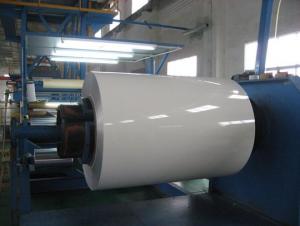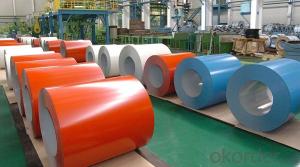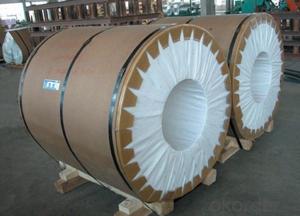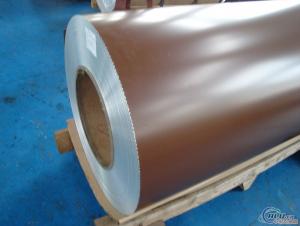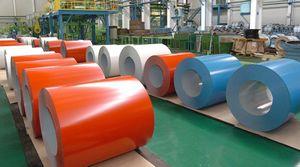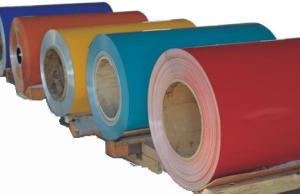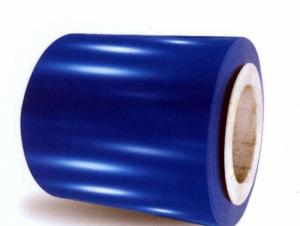York Aluminum Coil PVDF Color Coated Aluminium Coils for Decoration AA3003
- Loading Port:
- China Main Port
- Payment Terms:
- TT or LC
- Min Order Qty:
- -
- Supply Capability:
- -
OKorder Service Pledge
OKorder Financial Service
You Might Also Like
1.Structure of Product Description
PVDF Coated aluminium coils are widly used in decoration field. For the paints, there are two kinds: One is Polyester, and the other is PVDF. The price of PVDF is much higher than PE. However, the period of PVDF will be last longer, it can be remain 15-20 years. Compared to PE, it is 10-15 years.
2. Main features of the product
a.Competitive price---We have our own mills and can produce mill finished aluminium coils, so we can control the production cost better.
b.Professional after-sale service---We have more than 15 years exportation experience and you need not worry about the exporation problems.
c.Fast delivery time---We can control the delivery time within 35 days.
3. Image
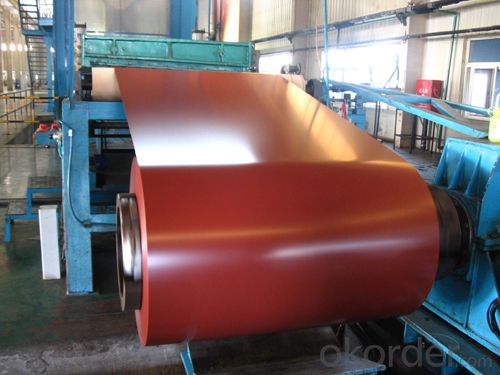
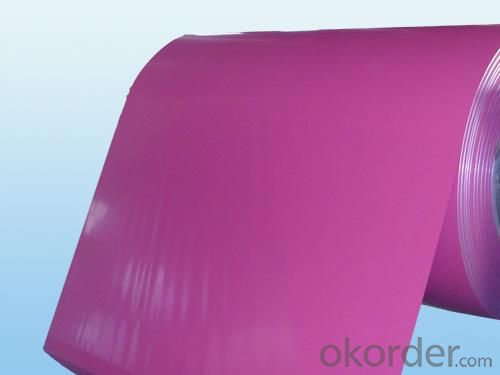
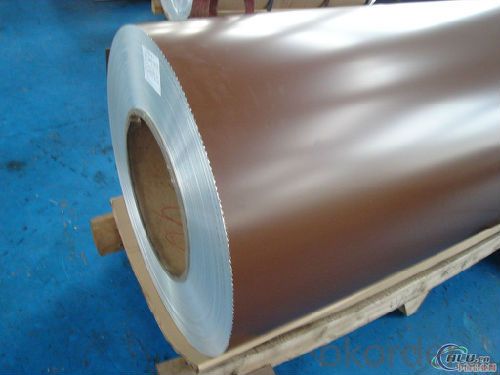
4.Products Specification
| Alloy | Temper | Painting | Coil ID | Coil Weight |
| AA3003 | H14,H16,H18 | PVDF | 508MM | 2-2.5 TONS |
5.FAQ:
What is the quality standard?
---Usually our standard is GB3880-2006
What is the largest width?
---It is 2300mm
What is the MOQ?
---Usually we can accept 80 tons.
- Q: Can aluminum coils be used for electrical transformers?
- Yes, aluminum coils can be used for electrical transformers.
- Q: im doing this essay in my chemistry class that suppose to be a ficional story about the day my element, aluminum, slowly began disappearing.i know some things that will happen like no soda cans of anything of that, no foil no forks or spoons anything metally. i need more effects that will happen but my major problem is how to start this. i have no clue like how to begin.can anyone help pleased.!
- Mass produced things like aluminum don't just disappear in one day. They would already use alternative resource by the time it was scarce.
- Q: How do aluminum coils contribute to lightweight vehicle design?
- Due to their unique properties and manufacturing processes, aluminum coils play a crucial role in the attainment of lightweight vehicle designs. Aluminum, being a lightweight material itself and weighing only about one-third of steel, is an ideal choice for lightweight vehicle design. When aluminum is formed into coils, it offers various advantages that contribute to the overall reduction in vehicle weight. First and foremost, aluminum coils possess high formability, enabling the creation of complex shapes using less material. This characteristic allows automakers to design intricate body panels and structural components that are both lightweight and possess improved aerodynamics and fuel efficiency. The ability to shape aluminum coils intricately also provides increased flexibility in design, leading to more innovative and visually appealing vehicle designs. Secondly, aluminum coils exhibit an exceptional strength-to-weight ratio, making them an excellent option for structural components. Despite their lightweight nature, aluminum coils provide exceptional structural integrity, ensuring the safety and durability of the vehicle. By incorporating aluminum coils into the chassis, suspension systems, and other critical components, automakers can reduce weight while maintaining the necessary strength and rigidity required for safe operation. Moreover, aluminum coils possess excellent corrosion resistance, which is vital for the long-term longevity of the vehicle. Corrosion can significantly impact the structural integrity and overall performance of a vehicle. By utilizing aluminum coils, automakers can minimize the risk of corrosion-related issues, resulting in a longer lifespan for the vehicle and reduced maintenance costs. Lastly, the utilization of aluminum coils aids in the overall reduction of vehicle weight, leading to improved fuel efficiency and decreased greenhouse gas emissions. Lighter vehicles require less energy for acceleration and to maintain speed, resulting in enhanced fuel economy. This benefit becomes increasingly significant as the automotive industry strives to develop more sustainable and eco-friendly vehicles. In conclusion, aluminum coils make a significant contribution to the design of lightweight vehicles by offering high formability, exceptional strength-to-weight ratio, corrosion resistance, and overall weight reduction. These properties enable automakers to design vehicles that are not only lighter but also safer, more fuel-efficient, and visually appealing. As the demand for lightweight vehicles continues to rise, aluminum coils play a vital role in achieving these design objectives.
- Q: Is it safe and effective to use aluminum coils for baking purposes?
- <p>Aluminum coils are generally not recommended for baking. While aluminum is a good conductor of heat and is used in some baking pans, using aluminum coils directly in baking can lead to uneven heating and potential health concerns due to the leaching of aluminum into the food. It's better to use materials specifically designed for baking, such as silicone or metal baking sheets, which are safe and provide even heat distribution.</p>
- Q: How are aluminum coils made?
- Continuous casting and rolling is the method utilized for the production of aluminum coils. The process commences by melting aluminum ingots or scrap in a furnace. After reaching the desired temperature, the molten aluminum is transferred to a holding furnace. Subsequently, the molten aluminum is continuously cast into a solidified strip, which is then passed through a series of rolling mills. The rolling mills exert pressure on the aluminum strip, reducing its thickness while increasing its length. This procedure is repeated multiple times until the desired thickness and width are attained. Simultaneously, the aluminum strip is cooled and lubricated during the rolling process to prevent adherence to the rollers and enhance the surface finish. Once the rolling is complete, the aluminum strip is coiled to form a continuous sheet of aluminum coil. To ensure stability during transportation and storage, the coils are typically wound tightly, minimizing any air gaps. At this stage, the coils can undergo further processes such as annealing. This involves heating the coils and gradually cooling them to enhance their mechanical properties, making them more suitable for specific applications. In summary, the production of aluminum coils comprises a combination of melting, casting, rolling, and coiling procedures. The ultimate goal is to generate top-quality coils with the desired dimensions and properties.
- Q: What are the maintenance requirements for aluminum coils?
- The maintenance requirements for aluminum coils typically involve regular cleaning to remove dirt and debris, inspection for any signs of corrosion or damage, and ensuring proper airflow around the coils to prevent overheating. Additionally, periodic lubrication of moving parts and regular filter replacement are recommended to maintain optimal performance and efficiency.
- Q: How are aluminum coils typically stored and transported?
- Aluminum coils are typically stored and transported in a horizontal position. They are often secured with straps or bands to prevent movement during transportation. Additionally, they are usually stored in a covered or enclosed area to protect them from environmental factors such as moisture or dust.
- Q: What is the typical lead time for ordering aluminum coils?
- The typical lead time for ordering aluminum coils can vary depending on various factors such as the supplier, quantity ordered, and current market conditions. In general, lead times for aluminum coils can range from a few weeks to several months. If the coils are readily available from the supplier's stock, the lead time could be relatively short, typically around 2-4 weeks. This is the case when the supplier maintains a consistent inventory and has the desired specifications and quantities readily available for immediate shipment. However, if the coils need to be custom-made or if the supplier doesn't have sufficient stock, the lead time can be longer. Custom-made aluminum coils may require additional processing time, such as rolling, annealing, or coating, which can extend the lead time by a few weeks or even months. Additionally, market conditions and demand fluctuations can impact lead times. During periods of high demand or when there are supply chain disruptions, lead times may increase due to limited availability of raw materials or production capacity. To obtain a more accurate estimate of the lead time for ordering aluminum coils, it is best to contact the specific supplier or manufacturer directly. They can provide detailed information based on their current inventory, production capabilities, and any other factors that may affect lead times.
- Q: Is it possible to utilize a grinder to smooth out or remove a damaged area on a steel coil?
- <p>Yes, you can use a grinder to grind down a damaged section of a steel coil. However, it's crucial to use the appropriate type of grinder designed for metalworking and to ensure safety precautions are taken, such as wearing protective gear. The grinder should be capable of handling the hardness of the steel and should be operated by someone experienced with such equipment. Always follow the manufacturer's guidelines and safety standards to prevent accidents and ensure the effectiveness of the grinding process.</p>
- Q: What rules or laws govern the transportation of old or damaged aluminum coils?
- <p>Yes, there are regulations on the transportation of old or damaged aluminum coils. These regulations often fall under hazardous materials or waste transportation laws, depending on the condition of the coils. In the United States, the Department of Transportation (DOT) regulates the transportation of hazardous materials, which may include damaged aluminum coils if they pose a risk. The Environmental Protection Agency (EPA) also has guidelines for the transportation of waste materials. Internationally, the International Maritime Dangerous Goods (IMDG) Code and International Air Transport Association (IATA) Dangerous Goods Regulations provide guidance for the safe transport of such materials. Compliance with packaging, labeling, documentation, and handling requirements is crucial to ensure safety and avoid penalties.</p>
Send your message to us
York Aluminum Coil PVDF Color Coated Aluminium Coils for Decoration AA3003
- Loading Port:
- China Main Port
- Payment Terms:
- TT or LC
- Min Order Qty:
- -
- Supply Capability:
- -
OKorder Service Pledge
OKorder Financial Service
Similar products
Hot products
Hot Searches
Related keywords
